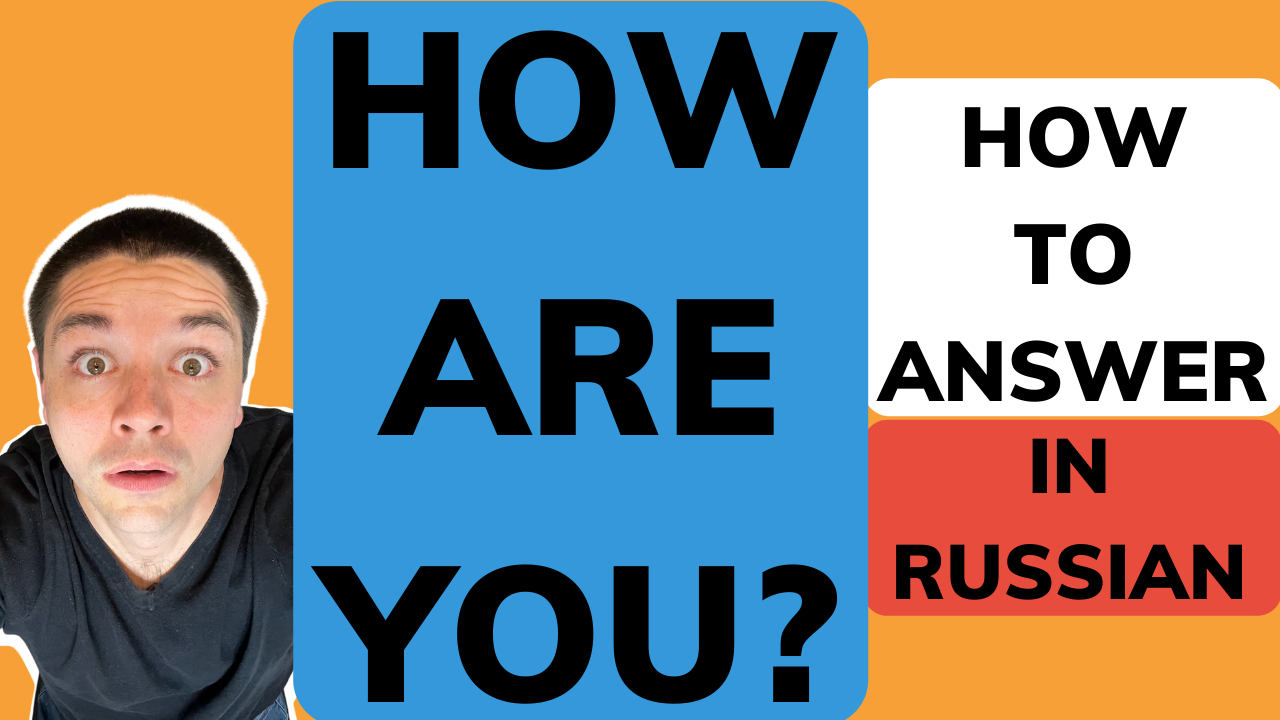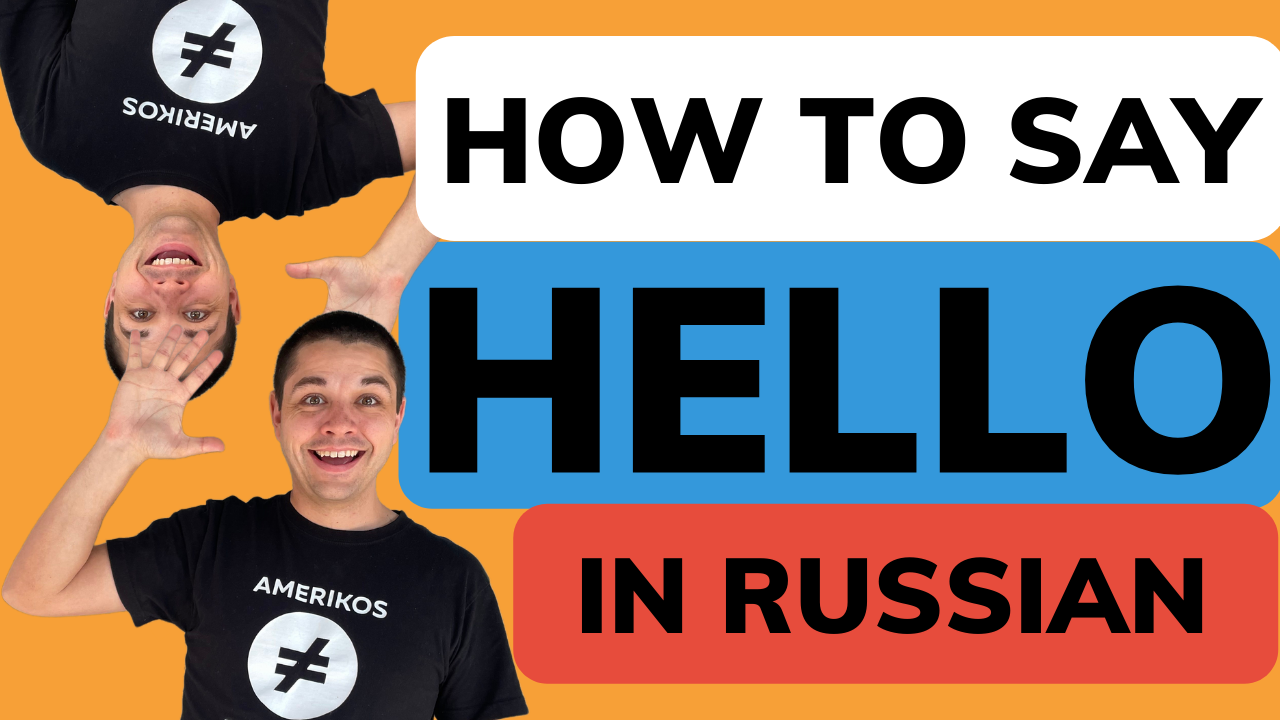Хорошо или плохо? | How to Answer How Are You in Russian | What to say when someone asks how you are in Russian

How to answer “How are you” in Russian
Typically when someone answers the question "How are you" in Russian there are three possible types of answers: positive, negative, and neutral. In English you are almost expected to give a positive answer because it facilitates the movement of the conversation from greetings and introductions to the real topics of discussion. But in Russian you are more likely to hear a range of positive, negative, and neutral responses. Remember that "How are you?" in English is very often a greeting, but in Russian it's not.
35 Ways to Answer "How are you" in Russian
There are so many different ways to answer this question that it's hard to make a list. I've included some of the most popular answers, but people are very creative and come up with new responses all the time. Try to find a few replies to this question that suit you.
Positive answers
Хорошо. = Fine.
Pronunciation: "hah-rah-SHO" ; /ha:ra:'ʃo/
You could also say "У меня всё хорошо." or just...
How to Ask How Are You in Russian | What's up in Russian | How's it going in Russian

Asking "How are you?" in Russian is different than asking it in English. First of all, Russian speakers ask these kinds of questions less often than English speakers because English uses them as greetings. Sometimes English speakers see each other and one says "What's up?", then the other says "How's it going?", and then they part ways. Neither answered the other's question. In Russian these questions are not rhetorical and answers are expected. So, after you learn how to ask "How are you?" in Russian, you need to learn how to answer "How are you?" in Russian.
“How are you doing?” in Russian
Как ты? = How are you?
Pronunciation: "kahk tee" ; /ka:k ti/
This is probably the easiest phrase to remember. In the present tense in Russian we omit the verb to be, so we don't need a word for "are" here. Just "Как ты?" is fine. If you want to change this informal phrase into a formal one, you can say "Как Вы?"
Как дела? = How are things?
Pronunciation: "kahk deh-LAH" ; /ka:k de'la:/
"Как д...
20 Russian Greetings and Farewells | Saying "Good morning!", "Hello", "Hi" in Russian

Informal farewells and greetings are used between family members, peer group members, and people of the same age. When you speak with someone older than you or in a higher position than you, social convention dictates that you use formal language.
“Hello!” in Russian
Здравствуйте! = Hello!
Pronunciation: "ZDRAHV-stvooy-tyeh" ; /'zdra:vstvu:ɪtje/
I'm not going to lie - this is difficult word to say. Some words in Russian have crazy consonant cluster and it just so happens that the word for "Hello!" is one of them. Yes, the word starts with three consonants Z, D, and R; and in the middle it has a four-consonant cluster of V, S, T, and V again. If you're having trouble saying S after V, have no fear. V is usually pronounced like F when it comes before another consonant sound, which helps us pronounce them together.
“Good morning!” in Russian
Доброе утро! = Good morning!
Pronunciation: "DOE-bro-yeh OO-truh" ; /'dobroje 'utrə/
If you're walking down the street in Moscow waving to ev...
How (and Why) to Say No in Russian | Detailed Explanation | Useful Intermediate Russian Vocabulary

Nyet, нет, no. You can write it in Russian with the Cyrillic alphabet: нет. You can write it in Russian with the Latin alphabet: nyet. Or you can just write it in English: no. But when you say it, say it decisively.
How do you say “No!” in Russian?
No! = Нет!
The word "нет" is pronounced like "nyet" in English or /njet/ in the International Phonetic Alphabet (IPA). The Russian letter "е" sounds like "yeh" in English or /je/ in IPA.
It can be difficult to remember that the letter "н" in Russian is pronounced like the letter "n" in English. And it can be difficult to recognize when a word is written in English or in Russian. For example, нет <-- This word was written using a Russian keyboard, but this word was written using an English keyboard --> HeT. Is it a new English word "het" or is it the Russian word "нет"?
How do you say “Yes!” in Russian?
Yes! = Да!
The word "да" is pronounced like "da" in English and /da/ in IPA. The letter "д" sounds like "d" in English.
It can be dif...
What does Есть mean?

There is no good English equivalent of the Russian word есть. The closest translations are to eat, to be, and sometimes even to have. Today we'll look at those three meanings.
Есть - How to say eat in Russian
There are other ways to say "eat" in Russian, such as:
- кушать
- хавать
- есть
Probably the most commonly used verb is кушать.
A realistic example using есть meaning "eat" would be:
- Будешь есть? (Will you eat? / Are you going to eat?)
Есть - How to say be in Russian
Есть also means "to be" in Russian. But it can be difficult to remember that in the present tense Russian tends to omit the verb "to be". So, you can say "Я есть Крис", but most people would say just "Я Крис".
Other verbs that also mean "to be":
- быть
- являться
- есть
A realistic example using есть meaning "be" would be:
- Он есть врач. (He is a doctor. / He is the doctor.)
Есть - How to say have in Russian
We can also use the word есть in a special construction that means "to have". Fo...
Don't say женщина

The Russian words девушка and женщина are not exact translations of their English equivalents: girl and woman. These words communicate nuances that are important to understand, due to their social implications.
Russian Girl or Woman
If we open up a translation dictionary, it will show us this:
- девочка = young girl
- девушка = girl
- женщина = woman
- бабушка = grandmother
- мальчик = boy
- молодой человек = young man
- мужчина = man
- дедушка = grandfather
And those translations are great. But they leave out social context.
How to speak with Russian women
In Russia, young women are usually called девушка. Whereas in English the word girl can imply immaturity and the word woman can imply maturity (psychological and otherwise), in Russian the word женшина implies that the person looks old. That's why you might call someone девушка even when they are 40 or older - to imply that they look young.
Getting a Russian Woman's Attention
When we want to get the attention of someone in Russ...
Not your usual greetings and farewells in Russian | How to say HELLO and GOODBYE in Russian

Some of the first things you learn when studying a language are greetings and farewells. And Russian doesn't make it very easy for us as students. I mean, during your first Russian lesson and you are forced to say: ЗДРАВСТВУЙТЕ! (zdravstvyuyte). "Are you kidding me?!" - you might be thinking. Well, the good news is that there are other ways to say HELLO and GOODBYE in Russian without twisting your tongue or sounding too formal. 
Here are some greetings for young people:
1) Instead of здравсвуйте, say: здрасте, привет, приветик, приветики, здоро́во, хай, хаюшки
2) Instead of как дела? say: как оно? как жизнь? как поживаешь? как ты?
And the same with saying GOODBYE. ДО СВИДАНИЯ (do svidaniya) somehow is known even by English speakers who have never had any Russian classes at all. But you don't have to use that one, in fact, Russian speakers don't use it when speaking with friends.
Here are some other farewells for young people:
1) Instead of до свидания, say: пока, пока-пока, ув...





